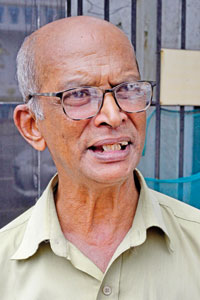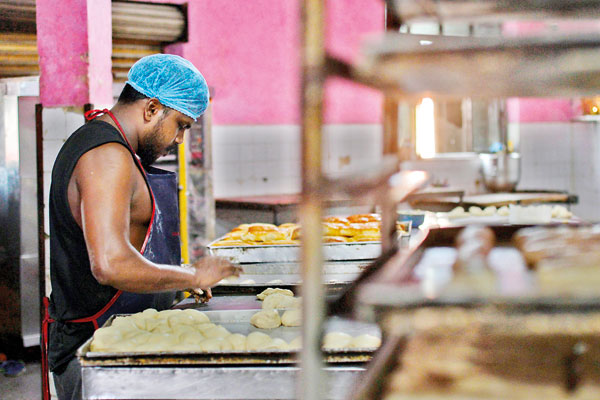News
Lower consumer prices a long shot despite power tariff cut
View(s):By Nathara Abeywickrema
Despite the electricity tariff reduction of 20% on average being aimed at easing financial burdens and stimulating economic activity, some sectors are yet to pass on these savings through price reductions.

A. Nadarajan from Victoria Bakery
All Ceylon Bakery Owners’ Association president N.K. Jaywardena, acknowledged the relief from reduced electricity costs but said the prices of key baking ingredients, such as flour, sugar, butter, and eggs, have risen sharply over the past year. This increase in ingredient costs makes it difficult for bakeries to lower product prices.
A. Nadarajan, accountant of Victoria Bakery in Kompanna Veediya, said that prices of essential baking ingredients remain unchanged and lowering prices is a challenge.
Similarly, the All-Ceylon Restaurant Owners’ Association points to significant increases in essential cooking ingredients, like palm oil and coconut oil, which prevent them from reducing menu prices. Its president Harshana Rukshan noted that while electricity is a component of operating costs, the surge in ingredient prices overshadows the savings from the tariff reduction.
Small-Scale Enterprise Owners’ Association national organiser, Niluksha Kumara, said that the electricity tariff reduction amounts to about Rs. 4 per unit. For an average industry consuming around 10,000 units, this results in a Rs. 40,000 decrease in costs. He noted that this reduction could lead to lower manufacturing expenses, fostering increased competition across industries and ultimately providing consumers with some relief in product pricing.

E.M. Amarajeewa, manager Rio Cinema
Ceylon Tourist Hotel Owners’ Association vice president Priyantha Thilakaratne said that water and electricity are the highest operating costs for privately run hotels. He noted that while electricity use cannot be controlled once a room is occupied by a guest, water charges are high despite the recent tariff reduction.
He urged that water charges also be lowered. Many hotels, he added, are still struggling to settle outstanding electricity bills, while also managing loans. He hopes that the benefits of the electricity tariff reduction could eventually be passed on to consumers.
He emphasised the need to promote solar power as a sustainable, long-term solution. “Solar energy plays a crucial role in reducing overhead costs for hotels. By adopting solar power, hotels can offer more affordable room rates while ensuring uninterrupted operation of all energy-intensive facilities. As an association, we urge the government to embrace solar as the country’s primary renewable energy source by establishing 20-year agreements with investors and providing hotels with long-term debt financing,” he said.

S.M. Fahim, manager internet café
Tourism veteran and president of The Hotels Association of Sri Lanka (THASL), M. Shantikumar, said that while the tariff reduction would provide some relief, it would only marginally impact hotel rates. He said many hotels are already operating at a loss and burdened with bank loans, making significant price reductions unlikely.
W.M.H. Fernando, a director of a Plastic Recycling Factory, added that while the 30% electricity tariff reduction for industries is welcome, it is still insufficient to significantly ease operating costs. He said more substantial relief is needed to ensure long-term competitiveness and sustainability.
The Sunday Times also spoke to a cross-section of people to gauge their views on the recent electricity tariff reduction.
S.M. Fahim, the manager of an internet café in Pettah, noted that photocopy machines and computers are the biggest energy consumers. While he hopes to lower service charges, he stressed that other utility costs must also decrease in parallel to ensure business sustainability.

T.H. Majith a consumer
E.M. Amarajeewa, manager of Rio Cinema Hall in Kompanna Veediya, said that the monthly industrial electricity bill typically amounts to Rs. 150,000. He hopes that the reduction would bring significant financial relief.
T.H. Majith, a resident of Kompanna Veediya, said: “The electricity tariff reduction offers much-needed relief during these tough times. It is a positive move by the government to ease living costs, though I hope it is a long-term solution, not just a temporary fix.”
Consumer advocacy groups and some business associations continue to call for passing on the benefits to consumers. They argue that even if electricity constitutes a portion of operating costs, any reduction should ideally be reflected in the pricing of goods and services.
Krishan Marambage, president of United Merchants Association of Colombo said that the electricity tariff reduction should not only support businesses but also ease the financial strain on the people.
He urged all sectors to pass on the benefits by lowering prices, taking into consideration lower production and service expenses.
“This should result in overall price reductions,” Mr. Marambage noted, emphasising the positive impact on small businesses, self-employed individuals, and energy-intensive sectors like hospitality, manufacturing, exports, and spice production. He suggested that many goods and services could see price cuts of at least 10% due to the tariff drop.
He said bakery industry operates primarily at night, relying on high-energy machinery such as dough mixers. Given the reduced electricity costs, a Rs. 15 decrease in bakery item prices is anticipated.
Asela Sampath, chairman of the National Consumers Front, mentioned that while restaurant food prices should decrease following the electricity tariff reduction, a decision has not been made. He assured that necessary action would be taken in due course.

No price relief for consumers yet on bakery items as price of flour, sugar, butter, and eggs, have risen sharply over the past year, say bakery owners. Pix by Eshan Fernando
Sanjeewa Dhammika, secretary of the Electricity Consumers’ Union, expressed dissatisfaction with the recent tariff reduction, stating that the union had expected a 30–35% decrease for domestic users and 40% for industrial consumers. He pointed out that if fuel prices were properly regulated, an additional 20% reduction could be achieved.
He revealed that the cost of electricity production has surged by 120% due to inflated fuel prices imposed by the Ceylon Petroleum Corporation (CPC). In 2022, while the actual production costs of fuel oil and diesel were Rs. 150 and Rs. 137 per litre, the CPC sold them to the Ceylon Electricity Board (CEB) at significantly higher rates of Rs. 419 and Rs. 164, respectively. Similarly, diesel, which had a fair price of Rs. 270 per litre, was sold at Rs. 460. This pricing disparity placed an additional Rs. 66 billion burden on consumers in 2022 alone.
The artificially high fuel prices have driven up electricity costs. For example, the reasonable cost of generating a unit of electricity using fuel oil is Rs. 20.50, yet consumers were charged Rs. 48. Likewise, diesel-based electricity, which should cost Rs. 38 per unit, was billed at Rs. 68.
Mr. Dhammika also highlighted the Public Utilities Commission of Sri Lanka’s (PUCSL) directive requiring the CEB to enter into a fuel supply agreement by March 31, 2025. He noted that while this condition has been included in every tariff amendment, it
has never been enforced. If the requirement is not met, the PUCSL has the authority to take legal action against the licensees. No such steps have been taken
so far.
Hence, the focus should be on ensuring that electricity pricing and distribution are fair and transparent, without burdening people with unnecessary costs, Mr. Dhammika said.
A senior official at the Consumer Affairs Authority (CAA) said that enforcing price controls would be impractical due to fluctuating costs of production and distribution. This makes it challenging to set fixed prices that accurately reflect market conditions while ensuring fair compensation for producers and suppliers. However, discussions on potential pricing regulations will be held with the CAA’s pricing division, and a final decision is expected next week.
Deputy Minister of Trade, Commerce, and Food Security, R.M. Jayawardena, asserted that while a decision has not been made yet on price regulations, discussions with industry stakeholders are ongoing.
The best way to say that you found the home of your dreams is by finding it on Hitad.lk. We have listings for apartments for sale or rent in Sri Lanka, no matter what locale you're looking for! Whether you live in Colombo, Galle, Kandy, Matara, Jaffna and more - we've got them all!

